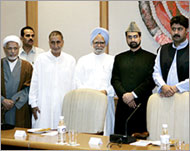Kashmir peace talks spark hopes
Few things arouse optimism in Kashmir after nearly 16 years of fighting, but residents say the latest peace talks between separatists and India’s prime minister provided a glimmer of hope.

Prime Minister Manmohan Singh held talks on Monday with five leaders of the All Parties Hurriyat Conference, an umbrella group of Kashmiri separatists, and promised to consider reducing troop levels in Indian-administered Kashmir if violence by rebels ceased.
Singh also agreed to review all cases of Kashmiris held in detention.
The rebellion has killed more than 66,000 people, many of them civilians.
Hurriyat leaders, such as Omar Farouq, have denounced the violence of some groups, which have questioned the authority of “moderate” leaders.
But on the streets of Srinagar, the summer capital of India‘s Jammu-Kashmir state, there was optimism that the dialogue marked a new beginning.
Significant steps
“It is a small yet significant opening for Kashmiris, Indians and Pakistanis. I think that they should grab the moment and work toward settling the issue,” said Abdul Hamid, a businessman in Srinagar.
 |
|
Singh met the separatists |
Hamid said that he was optimistic about the peace process but added that “past experience restrains us from jumping in joy”.
He was referring to the two rounds of unproductive talks between India‘s previous Hindu nationalist government and Hurriyat leaders.
Another Srinagar resident, Bashir Muzaffar, said that “the logical conclusion of peace talks should be an end to violence. Let’s see if that happens. Otherwise, these parleys have little meaning for us.”
Credibility
Muzaffar thinks that rebel groups should be involved in the talks because “ultimately combatants on both sides have a pivotal role in ending violence”.
The leader of the pro-India National Conference party, Ali Mohammad Sagar, agrees.
He suggested the “Indian government should invite rebel groups, like the Hizb-ul-Mujahideen, in the next round”. But the rebel groups oppose any dialogue with India that does not include a discussion of self-determination for Kashmir, an unlikely prospect.
Prominent separatist leader Nayeem Khan, who leads the Jammu-Kashmir National Front, told The Associated Press that holding talks with only one faction of the separatist bloc would affect the credibility of the peace process.
Rights abuses
|
“Indian government should invite rebel groups, like the Hizb-ul-Mujahideen, in the next round” |
Analysts estimate 400,000 Indian soldiers are posted in Kashmir and said the pledge to halt rights abuses was significant.
“The promise of stemming human rights abuses is the most welcome gesture,” said political scientist Rajendra Dayal, of Delhi University.
“But what makes it very important is that this is the first direct contact between an Indian head of government and moderate separatists.”
The discussions are part of a wider peace process between India and Pakistan to settle a long-festering dispute over the scenic, resource-rich Himalayan territory that has triggered two of their three wars.